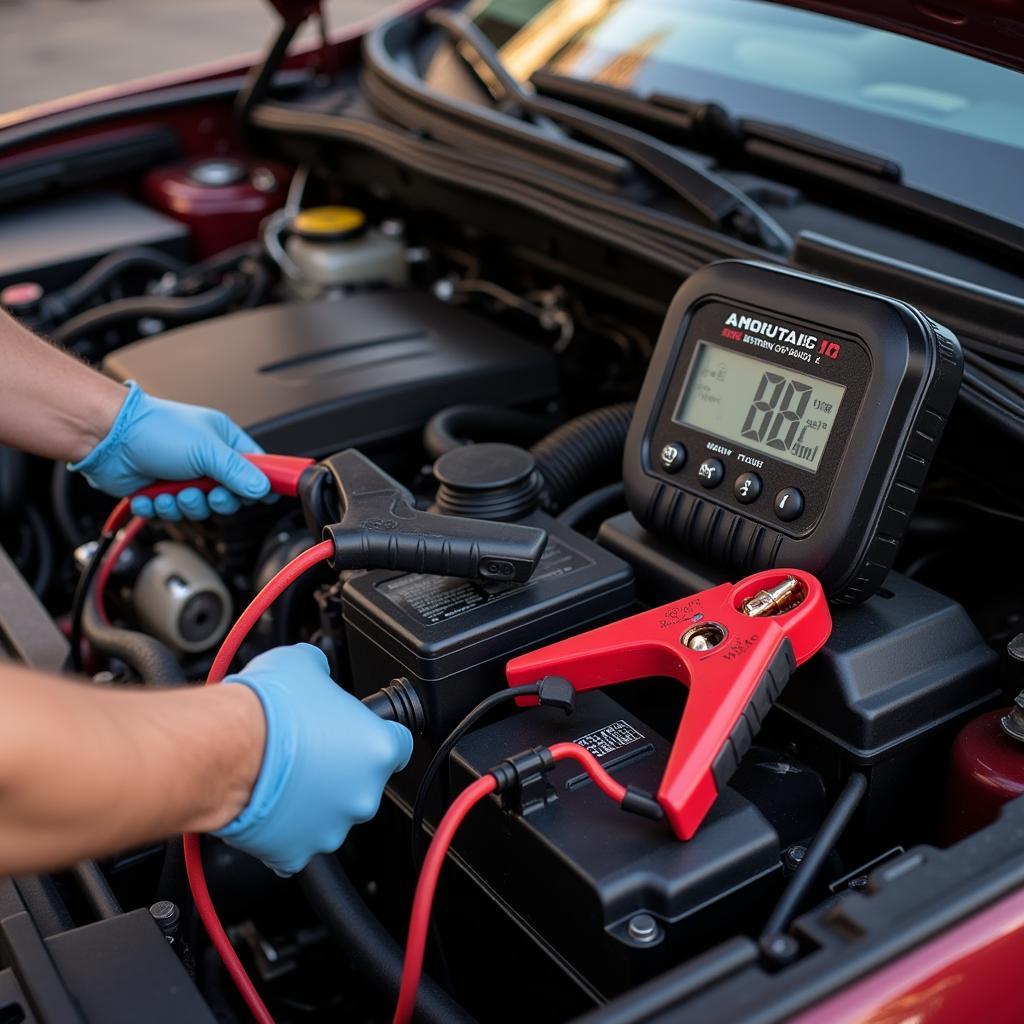Imagine cruising down the road on a scorching summer day, only to be met with a blast of hot air from your car’s vents. A malfunctioning AC can quickly turn a pleasant drive into a sweaty ordeal. Luckily, with a bit of guidance and some basic tools, you can often diagnose and even fix your car’s air conditioner yourself. This guide will equip you with the knowledge to tackle those AC woes head-on.
Understanding Your Car’s AC System
Before diving into repairs, it’s helpful to grasp the basics of how your car’s AC system functions. Essentially, it operates on a refrigeration cycle, circulating refrigerant through a series of components to cool the air:
- Compressor: This is the heart of the system, compressing the refrigerant gas and increasing its temperature.
- Condenser: Positioned at the front of your vehicle, the condenser cools the hot refrigerant gas, converting it back into a liquid.
- Receiver/Drier: This component stores the liquid refrigerant and removes any moisture from the system.
- Expansion Valve: This valve regulates the flow of refrigerant into the evaporator.
- Evaporator: Located inside the dashboard, the evaporator absorbs heat from the cabin air as the refrigerant evaporates back into a gas.
- Blower Motor: This motor blows the cooled air through the vents and into your car’s interior.
Common Car AC Problems and How to Fix Them
Now, let’s delve into some frequent car AC issues you might encounter:
1. AC Not Blowing Cold Air
This is a common complaint, often indicating a problem with the refrigerant level.
Possible Causes:
- Refrigerant Leak: Over time, refrigerant lines can develop leaks, leading to a gradual loss of refrigerant.
- Faulty Compressor: A malfunctioning compressor may not be able to circulate the refrigerant properly.
Troubleshooting and Fixes:
- Check Refrigerant Level: You can purchase a gauge and refrigerant to check the level yourself. Can you fix your own car air conditioner if the refrigerant is low? Sometimes, yes, but it’s often best to consult a professional for proper recharging.
- Inspect for Leaks: Visually examine the refrigerant lines and connections for any signs of oil residue, which can indicate a leak. Repairing leaks requires specialized equipment.
2. Weak Airflow from Vents
If the air from your vents feels weak, the blower motor or related components could be to blame.
Possible Causes:
- Failing Blower Motor: A worn-out blower motor may struggle to generate sufficient airflow.
- Resistor Issues: The blower motor resistor controls the fan speed. A faulty resistor can lead to limited speed settings or no airflow at all.
Troubleshooting and Fixes:
- Check Blower Motor: Listen for any unusual noises coming from the blower motor. If it’s failing, you’ll likely hear grinding or squealing sounds. Replacement is usually the best course of action.
- Inspect Resistor: The blower motor resistor is often located near the blower motor itself. Check for any signs of damage or burning.
3. AC Making Strange Noises
Unusual sounds emanating from your AC system can signal a range of issues.
Possible Causes:
- Worn-Out Compressor: A failing compressor can produce a loud grinding or whining noise, especially when engaged.
- Loose Belts: The compressor is driven by a belt. A loose or worn belt can cause squealing noises.
- Debris in Blower Motor: Leaves, twigs, or other debris can become lodged in the blower motor, resulting in rattling or thumping sounds.
Troubleshooting and Fixes:
- Address Compressor Issues: Compressor replacement is often necessary if it’s the source of the noise.
- Tighten or Replace Belts: Inspect the belts for signs of wear and tear. Tighten them if loose, or replace them if necessary.
- Clean Blower Motor: Accessing the blower motor housing and removing any debris can often resolve noise issues.
[Image-1|car-ac-compressor-inspection|Mechanic inspecting car AC compressor|A close-up image of a mechanic’s hands using a gauge to check the pressure of a car’s AC compressor. The image highlights the importance of proper refrigerant levels and professional inspection for complex AC issues.]
Preventive Maintenance for a Cool Ride
Just like any other system in your car, preventive maintenance can go a long way in keeping your AC running smoothly.
Key Tips:
- Regular Inspections: Have your AC system inspected annually, preferably by a qualified technician, to catch potential issues early on.
- Recharge Refrigerant: Over time, refrigerant levels naturally decrease. Recharging the system at recommended intervals can prevent problems.
- Keep it Clean: Ensure the area around the condenser is free of debris like leaves and dirt, which can hinder airflow and cooling efficiency.
- Run the AC Regularly: Even during cooler months, run your AC system for a few minutes every month. This helps to keep the components lubricated and prevents seals from drying out.
When to Seek Professional Help
While some AC repairs are manageable for DIY enthusiasts, certain issues are best left to the professionals. Situations where seeking expert assistance is recommended include:
- Complex Electrical Problems: Troubleshooting electrical issues within the AC system can be challenging without specialized knowledge.
- Major Component Failure: Replacing significant components like the compressor or condenser typically requires specialized tools and expertise.
- Refrigerant Leaks: Repairing refrigerant leaks demands specific equipment and handling procedures to ensure safety and environmental compliance.
[Image-2|car-ac-repair-shop|Car undergoing AC repair at a professional shop| An image showcasing a car inside a well-equipped auto repair shop, with a mechanic working on the vehicle’s AC system. This image emphasizes the importance of seeking professional help for complex repairs and refrigerant-related issues.]
Conclusion
Maintaining a well-functioning car AC is crucial for a comfortable driving experience, especially during hotter months. By understanding the basics of your AC system, you can troubleshoot common issues and even perform some repairs yourself. However, don’t hesitate to seek professional help when needed. Remember, preventive maintenance is key to prolonging the life of your AC and ensuring a cool and comfortable ride for years to come.
If you’re facing persistent car AC problems or are unsure about tackling repairs yourself, don’t hesitate to reach out to the experts at AutoTipPro. We’re here to assist you with all your car maintenance and repair needs. Contact us at +1 (641) 206-8880 or visit our office at 500 N St Mary’s St, San Antonio, TX 78205, United States.
FAQs
1. How often should I recharge my car’s AC refrigerant?
While there’s no set schedule, it’s generally recommended to have your AC system inspected and recharged if needed every 2-3 years.
2. Can I use any type of refrigerant in my car’s AC?
No, using the wrong type of refrigerant can severely damage your AC system. Refer to your owner’s manual or consult a professional to determine the correct refrigerant type.
3. Why is my AC blowing cold air on one side but hot air on the other?
This could indicate a problem with the blend door actuators, which control the temperature and direction of airflow.
4. How can I tell if my car’s AC compressor is bad?
Signs of a failing compressor include loud noises, inconsistent cooling, and a noticeable decrease in AC performance.
5. Is it safe to drive my car with a broken AC?
While it’s not inherently unsafe to drive with a broken AC, it can significantly impact your comfort, especially in hot weather.






Leave a Reply